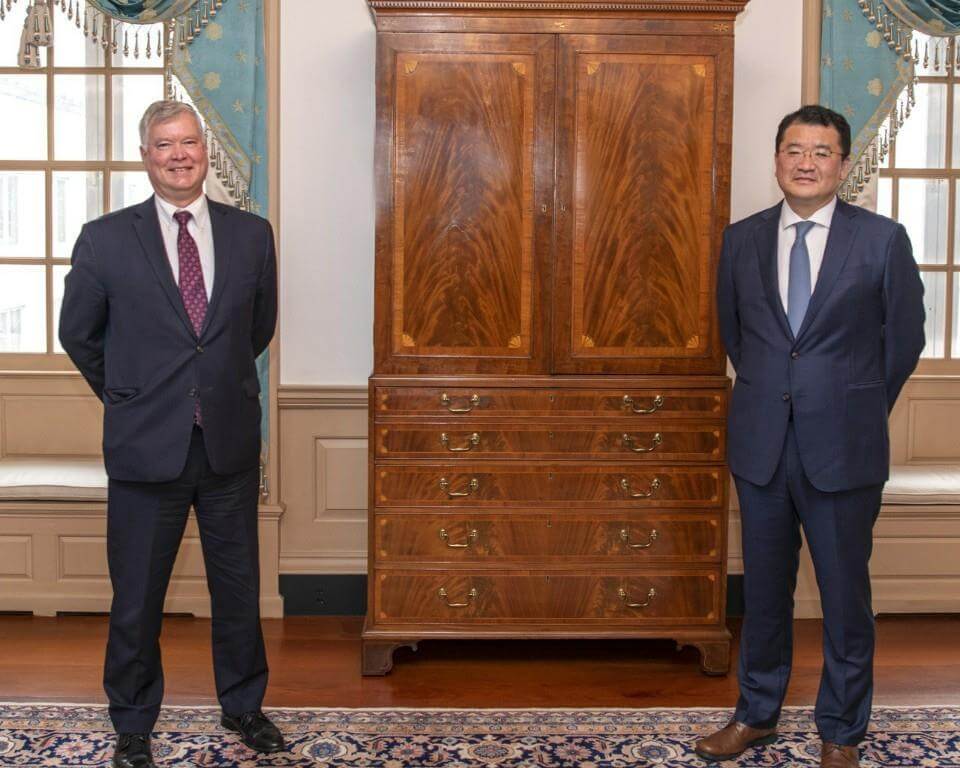To rejuvenate their alliance, the United States (US) and South Korea agreed to start a new working-level dialogue channel. The talks took place in Washington between the Deputy Secretary of State Stephen Biegun and Seoul’s First Vice Foreign Minister Choi Jong-kun.
According to Seoul’s Foreign Ministry, Jong-kun and Beigun shared the need to set up a new director general-level dialogue channel to review and cooperate on mutual concerns regularly. Reports suggest that the new consultative body is tentatively named the “Alliance Dialogue” and will be used to communicate on diverse matters concerning bilateral relations.
Following the talks, Jong-kun said, “For the past 70 years, the Korea-U.S. alliance has served as the linchpin of peace and stability on the Korean Peninsula and in Northeast Asia,” and added, “we agreed that Korea and the United States should continue cooperation and communication based on ironclad trust.”
A working group between the US and South Korea, established in November 2018, discusses North Korean issues, including denuclearisation, inter-Korean cooperation, and sanctions enforcement. However, the group has been criticised for hindering Seoul’s ability to pursue inter-Korean initiatives. Therefore, the new Alliance Dialogue is expected to be an independent consultative body, sepearate from their bilateral working group on North Korean matters.
Ever since the 10th Special Measures Agreement (SMA) expired at the end of last year, Washington and Seoul have been struggling to sign a new defense cost-sharing deal. In recent months, South Korea has intently been negotiating with the US on a cost-sharing agreement to maintain 28,500 American troops on its soil. Seoul was paying $900 million and offered to increase that amount by 13%. However, President Trump demanded South Korea pay $5 billion, stating, “They’ve offered us a certain amount of money, and I’ve rejected it.” With the new communication channel, the hope is that the two sides can find common ground on the defense cost-sharing issue.
As part of his visit, the South Korean Diplomat also met Deputy National Security Adviser Matthew Pottinger to discuss bilateral relations and the Korean Peninsula situation. It was reported that Pottinger has urged Pyongyang to return to negotiations after the denuclearisation talks between President Trump and North Korean leader Kim Jong-un fell through. According to a soon to be published book by Washington Post journalist Bob Woodward, Kim Jong-un apparently never raised the issue of the presence of US troops in South Korea in his correspondence with Washington. “Pompeo concluded that Kim may have wanted US troops in South Korea because they were a restraint on China,” Woodward claims. Furthermore, the book also notes that dictator Kim began placing denuclearisation conditions three months after the first-ever summit with President Trump in 2018.
Although talks with North Korea failed, in November 2019, the US Defense Secretary Mark Esper announced that Seoul and Washington decided to put off the allies’ annual winter exercise “as an act of goodwill to contribute to an environment conducive to diplomacy and the advance of peace.”
Away from denuclearisation of the Korean peninsula, the US is seeking to advance relations with South Korea in other multilateral avenues in a new turn. During a virtual forum of the Quadrilateral Security Dialogue (QUAD), Biegun indicated that the US is looking to expand QUAD membership to include South Korea. Additionally, the US is seeking to expand the Group of 7 (G7) to include Seoul. Washington’s attempts to expanding various groupings appears to be in line with its policy of creating an anti-China bloc, in light of growing tensions with Beijing. Although South Korea has accepted the US offer of joining G7, it has been caught in the cross-fire between Washington and Beijing.
South Korea and US to Set Up New Working-Level Dialogue Channel
The allies have been in disagreement over cost-sharing of troops, and hope to resolve the impasse through the newly launched bilateral channel.
September 15, 2020

Deputy Secretary of State Stephen Biegun (left) poses with First Vice Foreign Minister Choi Jong-kun at the State Department in Washington. SOURCE: MINISTRY OF FOREIGN AFFAIRS/KOREA HERALD
